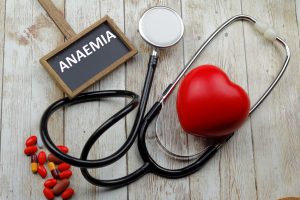
Anaemia is a condition in which the number of red blood cells or their oxygen-carrying capacity is insufficient to meet the needs of the body. Anaemia may be caused by
i) blood loss; ii) decreased red cell production; or iii) increased red cell destruction.
The diagnosis of anaemia is based on the haemoglobin concentration in the blood. Haemoglobin is the protein in the red cells that carries oxygen to the tissues. Iron is required for the synthesis of haemoglobin. In addition, vitamin B12 and folic acid are also needed to produce red cells. A lack of any of these can lead to anaemia, the most common being iron-deficiency anaemia. Requirements for iron in pregnancy are three times higher than in non-pregnant women and the requirement increases as pregnancy advances. Worldwide, one third of pregnant women are anaemic.
Following conditions put the mother at a greater risk of anaemia:
- Pre-pregnancy anaemia
- Malnutrition
- Inadequate spacing between pregnancies
- Pregnancy with twins or triplets
- Inadequate iron supplementation
All pregnant women should be screened for anaemia. If anaemia becomes severe, it might be harmful to the mother as well as the baby. Poor work capacity, susceptibility to infection, heart failure, premature and low birth weight babies, excessive bleeding after delivery are some of the complications associated with anaemia in pregnancy.
Here is how you can prevent and treat anaemia:
- Ensuring normal haemoglobin level before conception
- Iron-rich foods: dark green leafy vegetables, red meat, eggs, peanuts, dried beans and peas, iron-fortified foods, dried fruits such as apricots and raisins. It is advisable to take a pregnancy specific diet.
- Pairing iron-rich food or iron tablets with a food or drink high in vitamin C (lemon juice, citrus fruits, or strawberries) can enhance the absorption of iron
- Calcium, on the other hand, decreases iron absorption and should not be taken in combination with iron-rich food or tablets
- Folic acid and vitamin B12 should also be supplemented if found deficient
- Women who are intolerant to oral iron tablets may be advised iron injections
• Women suffering from severe anaemia may need blood transfusion
